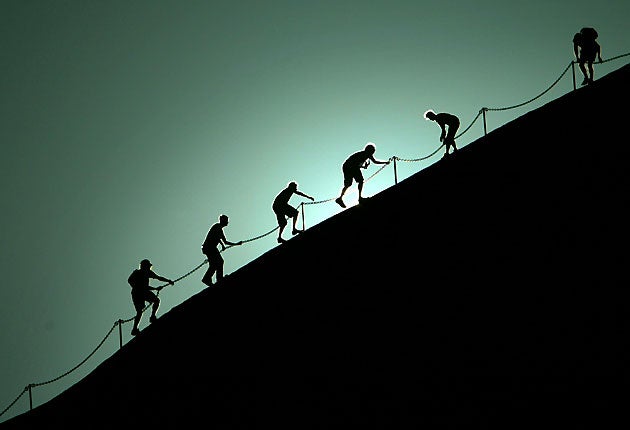Climbers may be barred from Uluru

Your support helps us to tell the story
From reproductive rights to climate change to Big Tech, The Independent is on the ground when the story is developing. Whether it's investigating the financials of Elon Musk's pro-Trump PAC or producing our latest documentary, 'The A Word', which shines a light on the American women fighting for reproductive rights, we know how important it is to parse out the facts from the messaging.
At such a critical moment in US history, we need reporters on the ground. Your donation allows us to keep sending journalists to speak to both sides of the story.
The Independent is trusted by Americans across the entire political spectrum. And unlike many other quality news outlets, we choose not to lock Americans out of our reporting and analysis with paywalls. We believe quality journalism should be available to everyone, paid for by those who can afford it.
Your support makes all the difference.An Australian government proposal to stop people from climbing the famed Uluru, in deference to the wishes of indigenous people, sparked debate today with lawmakers opposing the plan.
A draft management plan for the Uluru-Kata Tjuta National Park called for a ban on people climbing the 348-metre (1,142 ft) rock, which is sacred to local Aborigine people and visited each year by 350,000 people, half of them from overseas.
The plan for Uluru, formerly known as Ayers Rock, could be implemented within 18 months, but must be approved by national Environment Minister Peter Garrett after a two-month public consultation, a spokesman for Garrett said.
"Kevin Rudd must veto any plans by Peter Garrett to shut down Australia's world-famous Uluru climb," said conservative politician and environment spokesman Greg Hunt.
"Visitors from around Australia and the world would be stopped from completing the majestic and exhilarating journey," Hunt said.
The world heritage-listed rock, famed for its shifting red-ochre colours, is a top tourist drawcard and is climbed by more than 100,000 people each year, despite its central desert location and against the wishes of indigenous people.
"You can't go climb on top of the Vatican, you can't go climb on top of the Buddhist temples and so on and so forth," local elder Vince Forrester from Mutitjulu township told state radio.
Forrester said traditional owners of the rock, which is 9.4kms (5.8 mls) in circumference, have wanted the climb closed since the park was placed in indigenous hands in 1985. The monolith features strongly in indigenous creation myth.
"Obviously you have to respect our religious attachment to the land too, so we're saying please do not climb Uluru. We've said it in all languages," Forrester said.
But outback Northern Territory Tourism Minister Chris Burns said his government did not back the indigenous proposal.
Hunt said the national government should not contemplate the closure of the rock at a time when Australia's tourism industry was under threat from the global financial crisis.
"Big Brother is coming to Uluru to slam the gate closed on an Australian tourism icon, the climb," he said.
But people responding to the state ABC radio website were divided, with some saying it was a "denial of the rights", and others calling for more respect of sacred areas.
"About time. We would be horrified if people were allowed to climb all over our churches or sacred sites," wrote Lilly.
Join our commenting forum
Join thought-provoking conversations, follow other Independent readers and see their replies
Comments